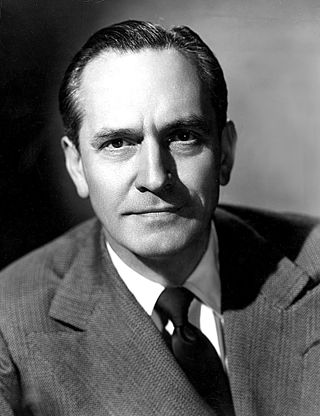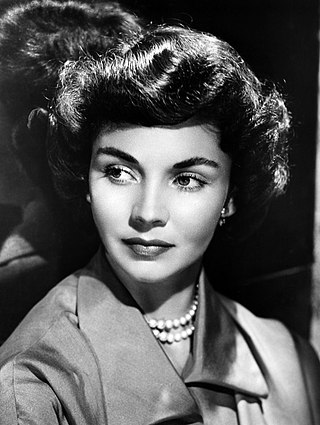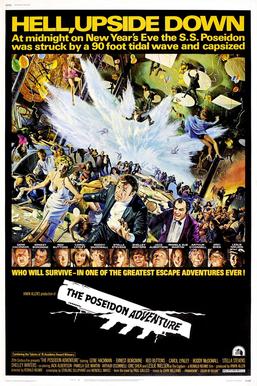Related Research Articles

Fredric March was an American actor, regarded as one of Hollywood's most celebrated stars of the 1930s and 1940s. As a performer he was known for his versatility. He received numerous accolades including two Academy Awards, a Golden Globe Award, and two Tony Awards as well as nominations for three BAFTA Awards and three Emmy Awards.

Jennifer Jones, also known as Jennifer Jones Simon, was an American actress and mental-health advocate. Over the course of her career that spanned more than five decades, she was nominated for an Academy Award five times, including one win for Best Actress, and a Golden Globe Award win for Best Actress in a Drama.

The Towering Inferno is a 1974 American disaster film directed by John Guillermin and produced by Irwin Allen, featuring an ensemble cast led by Paul Newman and Steve McQueen. It was adapted by Stirling Silliphant from the novels The Tower by Richard Martin Stern and The Glass Inferno by Thomas N. Scortia and Frank M. Robinson. In addition to McQueen and Newman, the cast includes William Holden, Faye Dunaway, Fred Astaire, Susan Blakely, Richard Chamberlain, O. J. Simpson, Robert Vaughn, Robert Wagner, Susan Flannery, Gregory Sierra, Dabney Coleman and Jennifer Jones in her final role.

William Franklin Holden was an American actor and one of the biggest box-office draws of the 1950s. Holden won the Academy Award for Best Actor for the film Stalag 17 (1953) and the Primetime Emmy Award for Outstanding Lead Actor in a Limited or Anthology Series or Movie for the television miniseries The Blue Knight (1973).
A disaster film or disaster movie is a film genre that has an impending or ongoing disaster as its subject and primary plot device. Such disasters may include natural disasters, accidents, military/terrorist attacks or global catastrophes such as a pandemic. A subgenre of action films, these films usually feature some degree of build-up, the disaster itself, and sometimes the aftermath, usually from the point of view of specific individual characters or their families or portraying the survival tactics of different people.
William Hal Ashby was an American film director and editor. His work exemplified the countercultural attitude of the era. He directed wide ranging films featuring iconic performances. He is associated with the New Hollywood wave of filmmaking with filmmakers such as Martin Scorsese, Woody Allen, Mike Nichols, and Sidney Lumet.

The Poseidon Adventure is a 1972 American disaster film directed by Ronald Neame, produced by Irwin Allen, and based on Paul Gallico's 1969 novel of the same name. It has an ensemble cast including five Oscar winners: Gene Hackman, Ernest Borgnine, Jack Albertson, Shelley Winters, and Red Buttons. The plot centers on the fictional SS Poseidon, an aging luxury liner on her final voyage from New York City to Athens, before it is scrapped. On New Year's Day, it is overturned by a tsunami. Passengers and crew are trapped inside, and a preacher attempts to lead a small group of survivors to safety.

Harold John Avery Russell was an American World War II veteran. After losing his hands during his military service, Russell was cast in the epic drama film The Best Years of Our Lives (1946), which earned him an Academy Award for Best Supporting Actor. He was the first non-professional actor to win an Academy Award for acting and the first Oscar recipient to sell his award.

Maureen Therese McGovern is an American singer and Broadway actress, well known for her renditions of the songs "The Morning After" from the 1972 film The Poseidon Adventure; "We May Never Love Like This Again" from The Towering Inferno in 1974; and her No. 1 Billboard adult contemporary hit "Different Worlds", the theme song from the television series Angie.
Stirling Dale Silliphant was an American screenwriter and producer. He is best remembered for his screenplay for In the Heat of the Night, for which he won an Academy Award in 1967, and for creating the television series Naked City, Perry Mason, and Route 66. Other features as screenwriter include the Irwin Allen productions The Towering Inferno and The Poseidon Adventure.
Frederick James Koenekamp, A.S.C. was an American cinematographer. He was the son of cinematographer Hans F. Koenekamp.

The Godfather is the soundtrack from the film of the same name, released in 1972 by Paramount Records, and in 1991 on compact disc by MCA. Unless noted, the cues were composed by Nino Rota and conducted by Carlo Savina. The song "I Have but One Heart" is sung by Al Martino, who performed it in the film as character Johnny Fontane.
Alfred Kasha was an American songwriter, whose songs include "The Morning After" from The Poseidon Adventure and "We May Never Love Like This Again" from The Towering Inferno.
Harold Frank Kress was an American film editor with more than fifty feature film credits; he also directed several feature films in the early 1950s. He won the Academy Award for Best Film Editing for How the West Was Won (1962) and again for The Towering Inferno (1974), and was nominated for four additional films; he is among the film editors most recognized by the Academy of Motion Picture Arts & Sciences. He also worked publicly to increase the recognition of editing as a component of Hollywood filmmaking.

"We May Never Love Like This Again" is a song written by Al Kasha and Joel Hirschhorn for the 1974 disaster film The Towering Inferno. It won the Academy Award for Best Original Song, and was performed by Maureen McGovern both for the film score and, briefly, in the film itself with McGovern portraying a singer.
William John Creber was an American art director and production designer. He was nominated for three Academy Awards in the category Best Art Direction. In 2004 he received an Art Directors Guild Lifetime Achievement Award and in 2020 he was inaugurated into their hall of fame. He is largely responsible for the design of the miniature model Flying Sub in the 1960s television series Voyage to the Bottom of the Sea and the miniature model Gemini 12 spaceship in the later television series Lost in Space. He died of complications of pneumonia on March 7, 2019, in Los Angeles.
William Ward Preston was an American production designer and art director. He was nominated for an Academy Award in the category Best Art Direction for the film The Towering Inferno.
Fredric Steinkamp was an American film editor with more than 40 film credits. He had a longstanding, notable collaboration with director Sydney Pollack, editing nearly all of Pollack's films from They Shoot Horses, Don't They? (1969) through Sabrina (1995).
Theodore George Soderberg was an American sound engineer. He was nominated for five Academy Awards in the category Sound Recording. He also won two Primetime Emmy Awards and was nominated for one more in the category Outstanding Sound Mixing.
Scott Conrad is an American film editor. Along with Richard Halsey, he won an Academy Award in the category Best Film Editing for the film Rocky.
References
- ↑ Oliver, Myrna (September 28, 1999). "Harold F. Kress; Film Editor Won 2 Oscars". Los Angeles Times . Retrieved January 9, 2022.
- ↑ Hussar, John (May 10, 1975). "Father-Son Team Gets Oscar For Expertise Over Disasters". The Desert Sun . Palm Springs, California. p. 15. Retrieved January 9, 2022– via Newspapers.com.

- ↑ "(untitled brief)". The Courier-Journal . Louisville, Kentucky. May 5, 2001. p. 81. Retrieved January 9, 2022– via Newspapers.com.

- ↑ "The 47th Academy Awards (1975) Nominees and Winners". Academy of Motion Picture Arts and Sciences . Retrieved January 9, 2022.